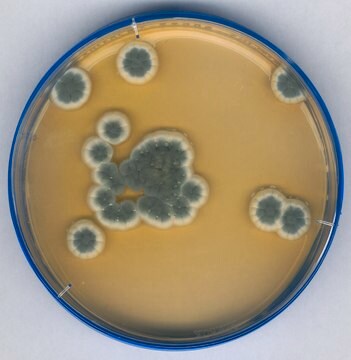1.05438
Sabouraud Dextrose Agar
GranuCult® prime, Dextrose 4 %, EP 5.6, USP 29, JP 4.05, granular, for yeasts, for molds, pack of 500 g and 5 kg
Synonym(s):
Fungus culture medium acc. to SABOURAUD, SABOURAUD 4% dextrose agar
Select a Size
Select a Size
About This Item
Recommended Products
Agency
EP 5.6
JP 4.05
USP 29
Quality Level
form
granular
composition
Dextrose, 4%
manufacturer/tradename
GranuCult® prime
packaging
pack of 500 g and 5 kg
technique(s)
microbiological culture: suitable
pH
5.6 (25 °C, 65 g/L in H2O, after autoclaving)
solubility
65 g/L
bulk density
680 kg/m3
Looking for similar products? Visit Product Comparison Guide
General description
Application
Analysis Note
Appearance (colour): yellowish-brown
pH-value (25 °C): 5.4 - 5.8
Typical composition (g/litre): Peptone from casein5.0; Peptone from meat 5.0; D(+)Glucose 40.0; Agar-agar 15.0.
Growth (Trichophyton mentagrophytes ATCC 18748): fair to very good
Growth (Trichophyton rubrum ATCC 28188): fair to good
Growth (Trichophyton ajelloi ATCC 28454): fair to good
Growth (Microsporum gallinae ATCC 12108): fair to very good
Growth (Microsporum canis ATCC 36299): good to very good
Growth (Geotrichum candidum DSM 1240): good to very good
Growth (Penicillium commune ATCC 10428): good to very good
Incubation: 7 days; 28°C
Growth promotion test in accordance with the harmonised method of EP, USP and JP.
Inoculum on reference medium (Candida albicans ATCC 10231 (WDCM 00054)): 10 - 100
Inoculum on reference medium (Aspergillus brasiliensis (formerly A. niger) ATCC 16404 (WDCM 00053)): 10 - 100
Colony count (Candida albicans ATCC 10231 (WDCM 00054)):
Colony count (Aspergillus brasiliensis (formerly A. niger) ATCC 16404 (WDCM 00053)):
Recovery on test medium (Candida albicans ATCC 10231 (WDCM 00054)): ≥ 70 %
Recovery on test medium (Aspergillus brasiliensis (formerly A. niger) ATCC 16404 (WDCM 00053)): ≥ 50 %
Incubation: C. albicans and A. brasiliensis up to 5 daysat 20-25°C.
The information above is current at this time of publication and is subject to change without notice (except for customers holding a change control agreement with our company). The information/format can be altered at any time and inany way if internal company matters or Standard Regulationsdo say so.
Footnote
The designations basic, plus, or prime are added to indicate the quality control level, from basic quality control to standard QC plus to prime for full regulatory compliance.
Legal Information
Storage Class Code
11 - Combustible Solids
WGK
WGK 3
Flash Point(F)
Not applicable
Flash Point(C)
Not applicable
Certificates of Analysis (COA)
Search for Certificates of Analysis (COA) by entering the products Lot/Batch Number. Lot and Batch Numbers can be found on a product’s label following the words ‘Lot’ or ‘Batch’.
Need A Sample COA?
This is a sample Certificate of Analysis (COA) and may not represent a recently manufactured lot of this specific product.
Already Own This Product?
Find documentation for the products that you have recently purchased in the Document Library.
Articles
Learn more about our culture media portfolio for microbial examination of non-sterile products, fully compliant with the harmonized Pharmacopoeia.
Our team of scientists has experience in all areas of research including Life Science, Material Science, Chemical Synthesis, Chromatography, Analytical and many others.
Contact Technical Service




